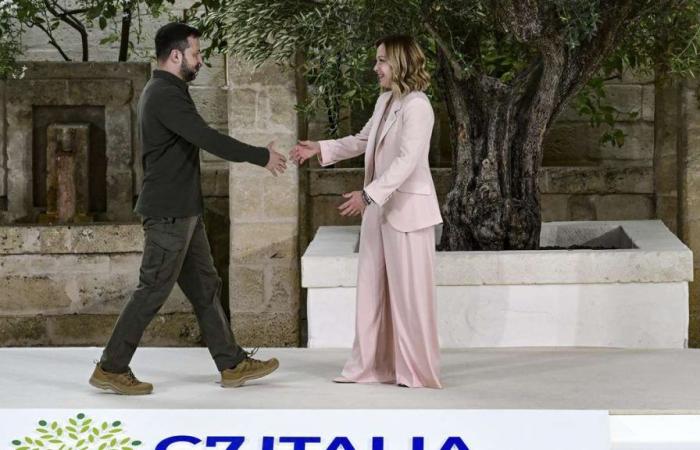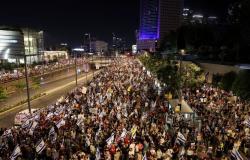The President of Ukraine, Volodymyr Zelensky, and the Prime Minister of Italy, Giorgia Meloni.
Photo: EFE – CIRO FUSCO
The Prime Minister of Italy, Giorgia Meloni, looked all her splendor at the G7 meeting, which she hosted this week. Not only because she was the only leader within these countries, which are considered the most solid democracies in the world, who arrived truly strengthened, as a consequence of the results of her party (the far-right Brothers of Italy) in the European elections over the weekend. past, but because he achieved several unprecedented feats. For example, the participation of a pope in the annual meeting. She also managed to ensure that direct mentions of the right to abortion were left out of the final declaration and that others, related to the rights of the LGBT community, were qualified or softened.
The document contains several commitments and concerns regarding several of the main global conflicts or challenges. For example, the war in Gaza, in the face of which they condemned the terrorist acts of Hamas, insisted that Israel must comply with international law and supported the plan for a truce presented by the Joe Biden government. There was also talk of the development of artificial intelligence, of which the Pope asked for ethical management, for example, never using it for war. And there was also space for the situation in Venezuela.
“We are deeply concerned about the current political, economic and humanitarian crisis in Venezuela and the lack of progress in the implementation of the October 2023 Barbados Agreement, with regard to the rights of the opposition within the electoral process and the decision to withdraw the invitation for an EU electoral observation mission.” Therefore, they called for the agreements to be respected and for the persecution of the opposition to stop. They also asked to resolve the controversy with Guyana over the Essequibo peacefully.
However, the first order issue was the war in Ukraine, with an unprecedented announcement: a loan of US$50 billion that will be guaranteed by the financial returns of the US$325 billion of Russian assets that the Western powers have frozen.
“It is important because it gives Ukraine fresh funds, which it needs right now. But, on the other hand, it creates an economic problem in the system because European and US banks enter a limbo situation,” says Ildikó Szegedy-Maszák, Ph.D. and director of the master’s degree in economic law at the Pontificia Universidad Javeriana. She refers to the fact that “some countries or oligarchs could decide not to leave their money in those banks because they would no longer feel that private property, which is the basis of the capitalist system, is being respected.”
That is to say, times of uncertainty may come about which little has been said in the midst of what Vladimir Putin classified as a “robbery.” “Yes, it has happened that funds have been frozen, it is not the first time that has happened, but it has never happened that the advances they produce (the assets) begin to be used and that they are delivered to someone,” adds the academic, for whom, in addition, the The decision of the Western powers is a new point of pressure for Vladimir Putin: the Russian oligarchy (affected by the decision) is at the base of support for the head of the Kremlin.
This is, additionally, a major determination before the November elections in the United States, where a Donald Trump willing to review the support given to Ukraine, to the detriment of kyiv, could emerge as the winner. For the teacher, Biden promoted these “strong and forceful agreements” in what could be his last G7 Summit. The same could happen with the French president, Emmanuel Macron, Ukraine’s other great ally, who could leave office after the advance of the elections, called for this summer.
Although Biden did not attend the conference for Ukraine that, with the participation of more than 90 States, takes place this weekend in Switzerland (representing the country is Vice President Kamala Harris), he left these agreements ready to be “presented in society”, in the words of Szegedy-Maszák, to the international community, in the hope of obtaining its support and that a strengthened Ukraine can emerge from the meeting. For the expert, it will also be an opportunity for the West to see which countries agree with its principles and which do not. Among the big absentees are China and, of course, Russia.
Others, like Professor Jesús Agreda, internationalist and professor at the Javeriana University, believe that the Ukrainian president, Volodymyr Zelensky, has prepared to promote his peace proposal in this space, which implies the Russian withdrawal, as well as the return of the territories that it has annexed, the complete opposite of Putin’s approach this week. The Russian president said he would cease fire if Ukraine withdraws from the east and abandons its aspirations to join NATO. “But it is not certain that all these States will support that idea (Zelensky’s). Some divergent alternatives may appear. We will see if a single statement can come out of it that supports his vision, but I am not sure that it will turn out as well as he wants,” Agreda told this newspaper in recent days.






